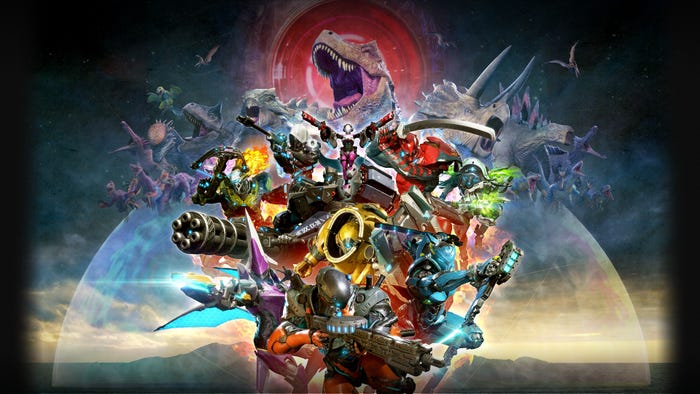
Featured Blog | This community-written post highlights the best of what the game industry has to offer. Read more like it on the Game Developer Blogs.
Third Stage of Game Development: Grow
Are you ready to take your game development to the next level? Not so fast there, cowboy. Growth is the biggest killer of business ventures. Force of Habit, an indie development in Bristol, has learned a lot through growth, and so can we.

[For the previous article on the 3 stages of game development, a helpful precurser to this article, see my blog post "Indie Entrepreneurs" or visit my website here.]
Force of Habit, the developers of Toast Time and the upcoming Timmy Bibble’s Friendship Club, probably didn’t think that back when they met at a game jam in 2011 they would be working alongside an animation and design firm (Clockwork Cuckoo), going on team building retreats, and hiring an accountant two blocks from their rented office space. But such is the life of developers in the growth stage.
 Often, this is the hardest stage to spot. It sneaks up like a slow alcohol until you know, beyond the shadow of a doubt, that you’re stone cold drunk. And that’s precisely why it’s the most dangerous stage.
Often, this is the hardest stage to spot. It sneaks up like a slow alcohol until you know, beyond the shadow of a doubt, that you’re stone cold drunk. And that’s precisely why it’s the most dangerous stage.
In fact, growth is more dangerous to a business than decline. No joke. Think about it simply from a time standpoint. It takes very little time to sack someone, but try hiring a fresh-faced college kid to keep up with growth and you’ve got weeks if not months of training on your hands before they can do what your current programmer can do. Not to mention the inter-team squabbles and financial constraints that can bring a business to its knees. It’s no surprise that growth is a minefield most businesses don’t navigate without consultants. And we wonder why the Beatles broke up…
That is precisely why Force of Habit spent a week in a 300-year-old Cornwall cottage with some collaborators to reorient themselves when it seemed the full-time game development grind was wearing on their vision. Sometimes retreats like this are the quickest, most effective way of remedying problems. And like all stages, this has its fair share of problems. Let’s look at just a few.
Pitfalls
Team Dynamics: People are hard to manage. Ask any married couple and they’ll tell you: it ain’t easy being tied to another person. We all have quirks and personalities that create strains, and these strains are like cracks that only grow larger with time. The dangerous approach is unfortunately the most common: neglect. But, as entrepreneurs, this is the stage where you cannot afford to be careless with your team. So update your resumes, because now you’re a human resources manager!
 Lost Spark: Does it feel like the things you were once passionate about only leave you apathetic? That is not an uncommon concern amongst people at this stage. If you once loved graphic design, you might be less enthusiastic when you need twelve more anime-eyed magical girls sprited by noon tomorrow. Or have you tried playing other people’s indie titles and can only think, “Wow, that lighting is pretty shoddy,” and, for some reason, it’s all you can focus on? Welcome to the club. Doing something for a living takes some of the spark from it. That doesn’t mean it’s gone for good, but it does mean you must learn to wade through a lot of crap before you find it.
Lost Spark: Does it feel like the things you were once passionate about only leave you apathetic? That is not an uncommon concern amongst people at this stage. If you once loved graphic design, you might be less enthusiastic when you need twelve more anime-eyed magical girls sprited by noon tomorrow. Or have you tried playing other people’s indie titles and can only think, “Wow, that lighting is pretty shoddy,” and, for some reason, it’s all you can focus on? Welcome to the club. Doing something for a living takes some of the spark from it. That doesn’t mean it’s gone for good, but it does mean you must learn to wade through a lot of crap before you find it.
Haste Makes Waste: Trying to hurry growth is the greatest mistake you can make. It is the most dangerous stage for a reason: everything that increases at this stage does so exponentially. That means you better have done your research before making any new hires or dropping cash on an untested marketing channel. Is that additional salary you’re paying out going to be offset with interest by the amount of money brought in? Or is that marketing channel going to make new customers or retain enough old ones to make the expense worth it? And these are just financial considerations – they don’t even begin to touch on strategy, operations, or team dynamics. Haste makes waste, so don’t be rash in your decisions, and use the mistakes you’ve made in less-costly stages to inform this one.
Benefits
And here too, there is much to be thankful for. The benefits of the Growth stage are legion, but they all tend to revolve around security. First, you are making enough money to cushion the development in case of unexpected emergencies. Now, you may not think so, but if you consider the periods of famine you’ve likely had leading up to this point, what you make now might not be a feast, but it’s certainly enough to stretch if worse came to it.
 But more importantly, you have gained a wealth of practical security. Just to get to this point requires developers be flexible knowledge-sponges. The amount of experience you’ve gained by now comes with a set of skills that very few people have. Need to do some freelance work on the side? No problem. You’ve got both the talent and network that it shouldn’t be too difficult to find side projects to pull through the tough times.
But more importantly, you have gained a wealth of practical security. Just to get to this point requires developers be flexible knowledge-sponges. The amount of experience you’ve gained by now comes with a set of skills that very few people have. Need to do some freelance work on the side? No problem. You’ve got both the talent and network that it shouldn’t be too difficult to find side projects to pull through the tough times.
And there will be tough times, but some general recommendations will go a long way to ease through them.
Recommendations
Slow and steady wins this race. The essentials here are to research major decisions from multiple angles, considering what effect your choices will have on the five core areas of the business. If you feel like the natural leader of this operation, a partner, or a supporting member, find your niche and establish those things with the rest of the group. A certain amount of hierarchy can do much to ease team tensions and set expectations of what each person is responsible for. Learn to see yourselves as an ecosystem, and fight the temptation to let ego enter the conversation. Rome wasn’t built in a day, and it certainly wasn’t built by one person – so remember the hard work you and others have put into this enterprise and respect that contribution. Take things carefully, thoughtfully, and as a team. That’s no guarantee of success, but it’s damn close.

Read more about:
Featured BlogsAbout the Author(s)
You May Also Like













